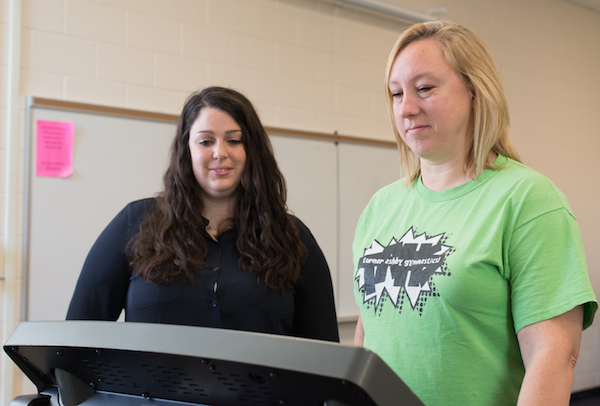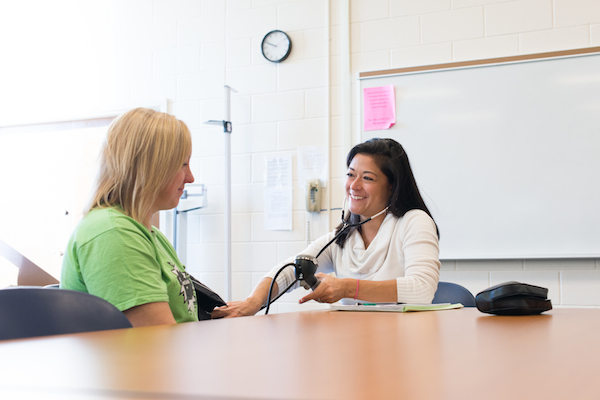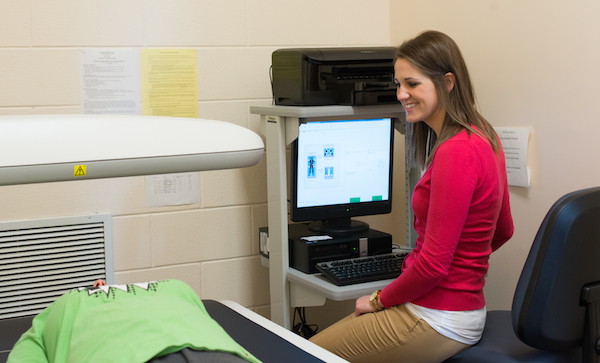Collaborative study tests prediabetes interventions
NewsStudents and faculty in the College of Health and Behavioral Studies are partnering with Sentara Rockingham Memorial Hospital to test exercise and nutritional interventions in sedentary, prediabetic men and women.
Graduate students Joan Mandelson (’05) in health sciences and Nicole Gilbertson and Katie Hilovsky (’07) in kinesiology are comparing the effects of two different exercise protocols, in conjunction with diet and lifestyle changes, on community members who have been identified as living with prediabetes.

According to the Centers for Disease Control and Prevention, 1 in 3 Americans is prediabetic. Of those individuals, up to 30 percent will develop Type 2 diabetes in the next five years. People who live with the disease are at higher risk for cardiovascular problems, blindness, kidney failure, stroke, and even loss of feet, toes or legs.
“We know that one of the main deterrents to people exercising regularly is a lack of time, so we’re testing to see if by doing high-intensity training we’re able to minimize the time in the gym while still getting the same, if not better, results.” —
Joan Mandelson, graduate student researcher
The study, part of the JMU-RMH Collaborative, has several components. Mandelson is looking at whether Sprint Interval Training — short bursts of maximum effort interspersed with longer periods of active recovery — can effectively reduce the risk of cardiovascular disease in prediabetics, while Hilovsky is measuring whether SIT is as effective as moderate-intensity activity in reducing their risk of developing Type 2 diabetes. Gilbertson, meanwhile, is looking at the psychological effects of SIT — whether subjects rate the protocol as more enjoyable than moderate-intensity activity.
“We know that one of the main deterrents to people exercising regularly is a lack of time, so we’re testing to see if by doing high-intensity training we’re able to minimize the time in the gym while still getting the same, if not better, results,” said Mandelson, who is concentrating her studies in nutrition and physical activity.
The study’s participants volunteer to receive three supervised training sessions per week in Godwin Hall and attend a weekly diabetes prevention class certified by the CDC. Throughout the 16-week trial, the researchers monitor participants’ heart rate and blood pressure and periodically measure their weight, body-fat percentage and metabolic processes.

One participant in the high-intensity group credits the study with helping change her life. At the midpoint of her training, the 58-year-old had shed 16 pounds, reported sleeping better at night and no longer became winded while climbing stairs. “The students are amazing,” she said. “They cheer me on, they’re there for me, no matter how much I don’t feel like doing what I know I should be. … But I’m scared to death of [developing] diabetes, so I’m committed to this.”

Hilovsky, whose undergraduate degree is in health assessment and promotion, worked with diabetics at a hospital in Savannah, Ga., prior to returning to JMU to pursue a master’s degree in clinical exercise physiology. “When it comes to exercise, everybody wants instant gratification, so what’s great is to see the participants respond to the Sprint Interval Training in just a few sessions,” she said. “We know it’s working. We have a great team, and hopefully we’ll be able to reduce the risk of diabetes in the community.”
With funding and support from Sentara RMH, the team hopes to continue the study. They are busy recruiting a second cohort for testing later this month.
“As much as this study affects their lives, I feel like it’s affecting mine as well,” Mandelson said. “It really validates my decision to return to JMU and pursue a career that I’m passionate about.”
###

